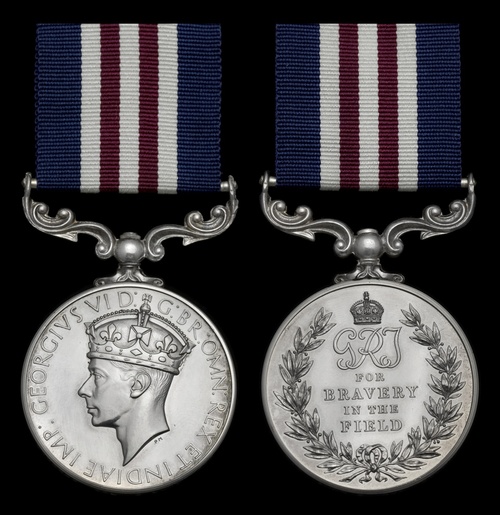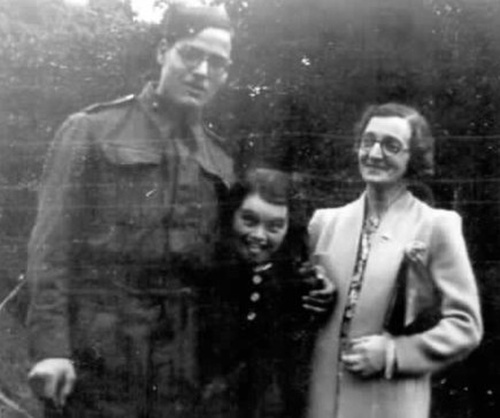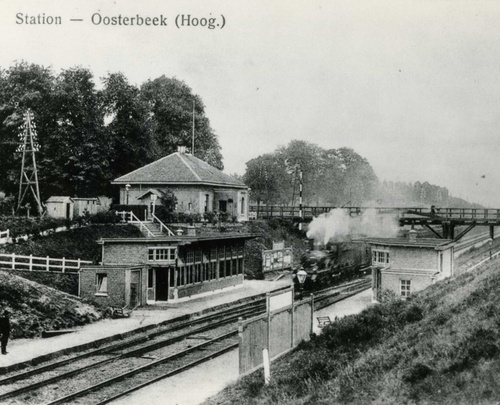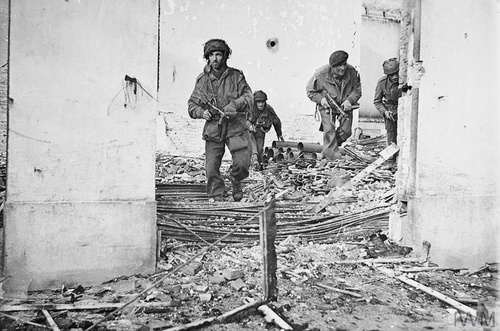Auction: 24003 - Orders, Decorations and Medals
Lot: 198
'Suddenly my buddy, Corporal Stan Lunt and I, on stolen time, decided to investigate a rumour of a German SP Gun at the station [Oosterbeek] nearby.
We slipped up a side street to the station. The street led over a small bridge beneath which, in a cutting lay the station. We were surprised to see a man in the station office.
Lunt with Sten gun ready strode across the bridge. I stood on the side to cover him. Beyond the bridge the road was flanked by a high hedgerow. Suddenly, above the hedge, a hand appeared and a German stick grenade tumbled down towards Lunt.
I shouted, he stepped back, firing a burst at the hedge. An unearthly agonised scream mingled with the explosion of the grenade.
Lunt scrambled back towards me unhurt, as I fired ten rounds rapid into the hedge. We scurried around the corner of a large house as the Germans counter-fired. From the house stepped a Dutchman, ‘would you like a cup of tea?’ — in English. Blimey what a time for a cup of tea.
‘No thank you, goodbye’. We scrambled over a wall and eventually rejoined our unit.'
Private W. Boldock, 1st Battalion, Parachute Regiment, recalls hot action at Arnhem
The Immediate Battle of Arnhem 1944 M.M. awarded to Corporal S. 'Stan' Lunt, 1st Battalion, Parachute Regiment, who gamely led the remnants of his Platoon in the heat of the legendary action, being wounded in action and inflicting heavy casualties on the enemy - being lucky to escape from going 'in the bag'
Military Medal, G.V.R., swivel suspension (5115286 Cpl S Lunt AAC), marked 'R' as an Official Replacement, extremely fine, in its Royal Mint box of issue
M.M. London Gazette 7 November 1944. The original Recommendation - for an Immediate award - states:
'During the airborne operations at Arnhem, September 17th-25th 1944, this NCO showed outstanding bravery and dash. On the night of the 18th/19th September, collecting together under great difficulties the remnants of his Platoon, he took command of 18 men and henceforth throughout the action controlled them as a solid, offensive, fighting force.
On the morning of the 20th September the Battalion was forced to withdraw across open ground from a street position which had been set on fire by the enemy. Corporal Lunt insisted on staying with 5 of his men and a Bren gun to cover this difficult withdrawal. He chose a good field of fire and halted the enemy at the peak of their advance, killing many of them. This action enabled the Battalion to withdraw in good time to proper new positions. Having expended all his ammunition Corporal Lunt led his men back, being wounded en route. In this action he gave a magnificent example of coolness and disregard of danger and, at all times, inspired his men with a fighting spirit of the highest order. Casualty 20 September 44' (Remained with unit). 26 September 44' Admitted 3 C.C.S. Nijmegen.'
Stanley Lunt was born in November 1919. Traces of War provides the following biography:
'...the son of Annora Bessie Beatrice & Randle Lunt at Criftins near Ellesmere, Salop. During WW2 he was severely burned while serving in North Africa. Lunt was hospitalised in London following his injuries he reiceived in Arnhem. At around that time he met a woman Miss Ozanne from the Channel Islands. A daughter, Carolyn Pacquita Lunt was born in Marylebone in the July-Sept quarter 1945. He remained in the Armed Services after the Second World War and eventually married in Lebannon a woman whose first name was Lore. With her he had a son named Gerald and possibly a daughter.'
Since this seminal action, oceans of ink have been spilt by survivors, historians and auctioneers alike. Thousands of fine reference works exist, but a first-hand account of the action at Arnhem, in which Lunt features heavily, is given by a comrade, Private (later Major) W. Boldock:
'‘It’s quiet.’ My first thoughts, as I drifted down to rendezvous in the tidy quilted fields beyond Arnhem. Strangely quiet.
Quiet that is if you rule out the ordered chaos for the newly descended First Parachute Brigade, as they assembled before the ‘push’ on Arnhem Bridge. Other thoughts had occupied my earlier moments on the clear Sunday morning in September 1944. The 17th. Thoughts of previous campaigns in Tunisia, Sicily and Italy, those Mediterranean battlegrounds of rugged hills, of heat and flies, of blistered feet, or sweat ----- and blood.
These were the first parachute campaigns. The novelty was gone now — the pride remained. We were airborne now, skimming the Fenlands of South Lincolnshire, where the hardy country folk were returning from the little churches or seeking the fleeting joys of rationed beers in the cosy country pubs. Pubs where I had but recently lingered. In Bourne, in Stamford and in Spalding.
Stray September clouds scudded above our American-crewed Dakota as our Platoon Officer gave us our last briefing. The plane rolled and lifted in the breeze. ‘No questions?’ — Right, let them pick the bones out of that’ and the shredded pieces of the officer’s brief shot away in the slipstream. Time is nothing when you are on these ‘ops’ — but time is everything too. Some lads of my stick were yarning, some singing, and some thinking. Soon, the coast of Holland was in sight. The tiny flood-bound islands, made by the German’ breaching of the dykes, and the spires of some large town or city. No flak — Thank God — No flak.
A little while and the forward planes were unloading. A multitude of tiny figures, falling and floating to the good earth. ‘Michelin’ like figures, paunched with packs and parachutes. Parachutes that cracked with a friendly tug as they opened. An open parachute straining above you is the most beautiful sight in the world — to a paratrooper. As I jumped I felt myself thump the fuselage of the plane. A startled thought — then I was clear. My ‘chute opened. I grasped the ‘lift webs’, feet and knees together, and down I floated above the descended gliders — drawn up below as in a car park. I hit the deck in soft plough land. A lucky drop. My unit rendezvoused on a green smoke signal. We moved off through wooded country towards Arnhem — and the bridge. The crackle of arms ahead foretold the battle to come. It was no longer quiet. The Germans, entrenched in strategic positions, were exacting dear payment on our forward companies for the progress they were making.
No time for thinking now. Tanks, armoured cars and machine guns belched death and destruction on the approach to Hartestien and Oosterbeek. The wounded drifted back through the darkening lanes. We halt, we start off again, we halt, we dig in — and on again, and again. We change direction. Our progress in the rear was dictated by the success of the leading companies. Stray mortar bombs and bullets harassed us. Platoon officer Sutton suffered a head wound. Sergeant McKnight took over. Vicious fighting ahead. A welcome lull. We move on. Beside a hedge lay Sergeant Bradley, seriously wounded, attended by the ‘medics’. An old pal from Ringway days. A little further ahead and the smouldering body of a Lieutenant. His pouch hit by a bullet and its phosphorus bomb exploded. We spent the weary night in the gardens of Oosterbeek. The residents crouched in the tiny cellars. Men, women and children. Women, who next day were to welcome us with Orange armbands and to pin the Free Dutch colours on our tunics as we passed along the bright, bloody streets.
Women who risked death in these streets, while succouring the wounded. Women who met death, with the Orange men, at the hands of the Germans, when the British had gone. Monday morning saw quicker progress, although pestered by snipers, positioned in houses and buildings on the way. Sly snipers shooting in surprise — shooting and running. At the Bridge things were hotting up. Casualties were very high. Dead strewed the buildings at its approach. Wounded fell out, received attention- and fell in again, to be re-wounded in turn, or killed. The Second Battalion held on, bloody but unbowed waiting the Second Army — and waiting for us, the First Battalion. The second air-lift, reinforcements were due in at ten on this Monday morning. Sweet relief. It was nearer 5pm, when they dropped. Too late — was it too late? We were halted at a cross roads in Oosterbeek. It looked as if we would be there forever.
Suddenly my buddy, Corporal Stan Lunt and I, on stolen time, decided to investigate a rumour of a German SP Gun at the station nearby.
We slipped up a side street to the station. The street led over a small bridge beneath which, in a cutting lay the station. We were surprised to see a man in the station office.
Lunt with Sten gun ready strode across the bridge. I stood on the side to cover him. Beyond the bridge the road was flanked by a high hedgerow. Suddenly, above the hedge, a hand appeared and a German stick grenade tumbled down towards Lunt. I shouted, he stepped back, firing a burst at the hedge. An unearthly agonised scream mingled with the explosion of the grenade. Lunt scrambled back towards me unhurt, as I fired ten rounds rapid into the hedge. We scurried around the corner of a large house as the Germans counter-fired.
From the house stepped a Dutchman, ‘would you like a cup of tea?’ — in English. Blimey what a time for a cup of tea.
‘No thank you, goodbye’. We scrambled over a wall and eventually rejoined our unit. Our beloved Sergeant McKnight greeted us — ‘Where the hell have you been?’
We were moving again, into Arnhem. Smoke and fire darkened the streets. Broken glass and broken vehicles, debris littered the roads. At one point we passed a German staff car, stopped with the occupants dead, one hanging from the driving seat, the other strewn below him on the road. Further on a water main had burst, spraying a minor torrent into the roadway. The body of a dead civilian, in blue overalls, lay in the gutter, with the cooling insolent water mingling with his blood, lapping gently round his body.
German planes swooped overhead, making for the beleaguered Second Battalion. No British planes.
Soon we were withdrawing. We couldn’t make the bridge. Sorry we can’t make it — our apologies were written in blood. We went back, from house to house. Scrambling across street corners. Further back. Night fell, still moving. A machine gun burst, wounded four of the platoon, from the treacherous darkness. Dawn on Tuesday, saw us withdrawing again. The German iron ring was closing in on us, relentlessly. Mortars thumped and clattered around us. Murderous thumps. German tanks whirled and snarled close by.
A call came for our Bren-gunners. I had one now. Lunt and I ran forward. At a corner, a German Tiger tank was firing over the cross-roads. Our anti-tank guns had smashed one of his tracks, but he was still firing.
I threw myself on the road, the massive front of the ‘Tiger’ rattled with the impact of my long burst. His gun ceased firing. A shout. Germans behind a hedgerow — I ran to a fence adjoining a corner shop, my Bren across the railings, and raked the hedge with fire. A momentary pause and then the sheet glass of the shop by my side crashed in a myriad of tinkling pieces. The tank had woken up. A near miss, thank God. I decided to move — we withdrew. As we left Arnhem, we knew somehow we wouldn’t be going back.
That night we hardened our position. The withdrawal had congested the road from Arnhem to Oosterbeek. Units became inextricably mingled, easy prey for marauding tank shells and mortars. We were to help with the withdrawal into the ‘perimeter’ round Oosterbeek. The bridge defenders must be on their last legs by now. We took over a house on an embankment overlooking the broken rail bridge across the Rhine. Our backs were against the wall, but the Germans gave us a quieter night.
Above Arnhem, in the distance, the sky glowered red with the fires burning beneath. Wednesday’s first light saw me sharing a fry-up of bacon with a gunner-officer. A cooked meal, my first since early Sunday in England. Especially welcome. Welcome because I had left my pack at one of the woodland halts. I had since lived off the land, pears and tomatoes, scrounged on the way. On of the lads began to shave. To shave in his meagre supply of water — precious water.
‘What the hell are you shaving for. When we get back they will think you have been to a bloody party’. When we get back — if we get back. From windows overlooking the Rhine and the low-lying fields between, with Bren gun I waited, waited with aggressive, war-like Jock Clements.
Below us, an anti-tank gun, camouflaged. Beyond this, skirting the field, were remnants of our unit, under Lieutenant Williams, a well respected officer. Further ahead lay a scattering of dead cattle and a deserted German ‘Flak’ position. Time slipped by, the Germans were late. Suddenly from nine o’clock left, over the railway, poured a fast moving arrowhead formation of troops. Our forward unit called ‘Enemy’ and we fired our Brens. The Germans never knew we were there. They never knew what hit them. At 300 yards they were wiped out — one man flailing his arms above his head.
Quiet again — At the broken bridge beyond, a German tank sneaked through. Before it could gain advantage the anti-tank gun fired. A direct hit. An explosion, flame bursts, and scurrying figures. Another danger dealt with. As the ‘Perimeter’ closed we withdrew again, under fire, to new positions, dug in along the edge of a dyke. Spasmodic mortar fire punctured the night. In one flare up we suffered a great loss — Sergeant McKnight — one of the boys.
Thursday — Hell is Thursday.
Supply planes were still coming in, dropping their precious supplies — into German hands. Sometimes ‘Dummy’ running, some at tree-top level, in flames from ‘Flak’, courageous but futile. We weren’t there. Crashing in flames from concentrated ‘Flak’ pounding like devilish piledrivers. In a hopeful attempt, Lieutenant Clarkson lit a yellow smoke candle. A recognition signal to the planes. Almost immediately he was hit by a well directed mortar bomb. The yellow cloud drifted slowly over our lines.
‘Anybody gotta fag — When’s the Second Army coming?’ ‘Look to your front’. We repelled an advancing company of Germans, reeling and scrambling for cover. The Germans were quick to react. Bombs showered among our positions, spewed by the multi-barrelled mortars, splinters splattered through the stinking smoke. Death stalked two-handed to his harvest. Amid this hell, pinned down, deafened and weary, I dozed off. Asleep in the inferno.
When I awoke (a hundred years later?) An astonished comrade exclaimed, ‘I thought you were dead’. Four PM — we must withdraw. The remnants of our Unit fell back along the base of a dry ditch. Myself, Corporal Lunt and Private Frankie Thompson covered them with Brens. We went back, through the smoke, eyes peering. An oath — Lunt had been hit. In the thigh from the flank, we couldn’t see where. We ran back. ‘Nothing serious’. He pushed us on.
A few yards and searing pain snatched my arm. A bullet scorched through my side and tore out of my back. I looked at my arm, shattered, with blood pouring down, trickling from my fingers. My back, now numb, felt saturated in blood. They came to me. Told me to rest. ‘Be back with a stretcher Wally’. Death only comes to other soldiers. All soldiers know this — I felt the pain, the weakness flowing over me.
This was it — This mustn’t be it. My thoughts flooded back to my home — to my home. This mustn’t be it — I don’t want to die. A silent prayer. I forced myself to my feet, arm useless, in pain. Dead and dying lay all around, choking in filthy smoke. I caught the eyes of a comrade in desperate agony. ‘I’m sorry mate, I can’t help, sorry’. I stumbled drunkenly across a thousand miles of fields and ditches. My eyes unseeingly. My legs rebelled but I forced myself on.
‘Whatsamatter Bol’? The voice of Ginger Pearce guided me to a large house. A house being used as a dressing station.
Outside the dead lay against the walls. Inside there was hope. ‘Get out’. ‘Only wounded in here’ — because I wasn’t carried in, I wasn’t wounded. God let me in — I fell in. They dressed my wounds, injected morphine and helped me to an upstairs room. A room where wounded lay all round the walls. No beds, no stretchers left for me. They lay me, belly down, on a narrow table. A seven-day clock ticked in a corner.
To sleep. The morphine helps. How it helps. I don’t remember waking but I must have awakened. The mists were slow in dispersing — and the pain came back.
The bullet had just missed my main artery in my arm and just missed my spine but it had torn my back muscles apart. As consciousness returned I listened and heard and saw,. At least I think I saw. I must have seen. Yes I saw. The clock ticked on, uncaring. The wounded lay suffering below my eyes. The lesser wounded could move around a little. The stench of blood prevailed. I had no shirt, just a thin blanket.
They gave me soup and water. Sometimes twice a day. A thumb joint depth of soup in a cup and the same of water. Water was precious now — paid for in blood.
It came from a pump in the garden of the house. Around the pump lay many dead, sacrificial bodies of men, fallen in the run to the pump. For water — for us. I was lucky, sometimes Corporal Lunt came to see me, from the battle outside. He gave me a ‘swig’ of water, and a cigarette. This we shared, a ‘drag’ a time with the others.
Beyond the window, away from the blur of pain, so they told me, was a fruit laden apple tree. This tree became the conversation and the hopes of the wounded — Fine red apples.
One of our wounded, unbelieving, strained to the window, to believe. He fell — shot. Death the reward for the curious — Fine red apples. Outside the battle raged. Tanks grinding and wheeling. Machine guns’ gibberish chatter resounded through the house. The building shook. Indiscriminate tank fire penetrated the lower rooms. Armour piercing shells added death to the already wounded. One shell tore through the walls above my back. Plaster and debris falling everywhere, clouted my injured back — What’s a little more pain. The apple tree remained unshaken.
They told me after this a fearless Airborne Padre went out with a Red Cross flag, confronted the tanks and demanded that the Germans ceased fire and to recognise the house as a hospital. The tank commander agreed. We were left alone for the little time remaining.
All these days we had been aware of a Dutch lady passing among us, helping, heartening. Late on Monday, 25th, Lunt came. He was sorry, they had to leave, across the river. Early on Tuesday the lady came round again. She was sorry, she had to leave before the Germans came. Daylight came, time passed. The Germans hadn’t come. I moved, slid from the table. I shuffled to the stairs, made to descend on my backside.
Halfway down the door burst open. Armed SS men sprang in, eager faces, weapons raised. Is this it? A tall Colonel of Medics thrust himself before them and shouted that the wounded must not be molested. They obeyed — yes they obeyed.'
Subject to 20% VAT on Buyer’s Premium. For more information please view Terms and Conditions for Buyers.
Sold for
£2,600
Starting price
£2000











